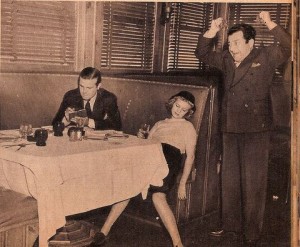
This dating guide from 1938 is pretty amazing — ladies, you should wear a bra, don’t talk too much, don’t put on make-up in front of men, focus entirely on what he wants to discuss and don’t get so drunk on the date that you pass out. As someone who has made every single one of those mistakes on a date, let me tell you, the more egregiously you behave, the more likely it is that the modern man will call you back and ask you out again. It’s one of those bizarre rules of the universe, like how when you go through a long celibate streak and you make an effort to consistently look great and shave your legs and wear cute lingerie you will not find a single person who has any interest in seeing you naked — until you decide to quit showering and you’re wearing graying period-stained underwear and you didn’t even bother putting on deodorant and you’re out at a bar only because you cannot take one more miserable night on your couch watching the Real Housewives and drinking wine from the $10-and-under table, and that’s when you’ll meet a super-hot dude who wants to lay you right then.*
That’s how the universe works for everyone else, right?
Anyway, this is all very good advice for the modern woman in 1938. “Don’t tug at your girdle” is definitely crucial to not blowing a date. But it’s a little unbalanced. Modern ladies get so much great dating advice (don’t talk too much, but make sure you talk some so that you aren’t boring! ask him questions but don’t badger or interrogate him! have a job, but make sure you don’t reveal that you make more money than him! wear make-up but not too much! wear a short skirt but not too short! wear heels because they make your legs look great but don’t wear heels because then you look high-maintenance!), and modern men get very little. So allow me to assist. From my own dating archive, my advice to the modern man looking for love from the modern woman:**
Do wear clean clothes to the date, but probably not your favorite over-sized fur coat.
Women don’t like men who leave their iPhones or Blackberries on the table during dinner.
If she’s dancing, get up and dance with her, for when a woman dances, she wants to dance.
Driving stick is sexy. Manage to hold her hand AND drive stick and the lady-boners will be poppin’.
Don’t discuss your bitch of an ex-wife.
If you take her to a dive bar and a drunk possibly homeless man hits on her, do not fly into a rage, and especially do not fly into a rage at her.
That story about how you once pooped your pants on the Jenny Jones Show? Save it until you know each other better.
It’s ok to mention that you also date dudes, but hold off on the part about how you primarily enjoy sex with men and only date women because you want to get married and have babies.
If you have an awkward sexual experience, you will not make her feel better by saying, “It’s ok, it’s definitely not as bad as the time I got puked on.”
Babies are nice, but a first date is not the time to mention that you want many babies, and you want them yesterday.
Pleat-front khakis? Burn them.
“I know this great little Italian place” is a great way to get a date, but the Olive Garden is not a great little Italian place.
If you ask her to dinner, don’t pick a place you can’t afford and then expect to split the check. The Modern Lady doesn’t mind paying half the bill, but she does mind an unexpected $200 dinner tab.
“What is this thing?” is not the proper response to a silk Isabel Marant body suit.
Be sure to mention your serious girlfriend before the end of the date.
Read books, or at least pretend to.
If you get a call during the date, don’t answer it. If you do answer it, don’t disclose that it’s a debt collector harassing you because you went on too many Barney’s shopping sprees.
Take off that gold chain.
_______________________________________________________________
*And if you’re me, you will not lay him right then because one-night stands scare you, so he’ll get your number and he’ll call and text you a dozen times and you’ll respond once before starting to ignore him because you’re embarrassed he met you in such a dilapidated state with your matted hair and probable body odor and oily t-zone, and you will also conclude that something is clearly wrong with him if he likes that sort of thing, and you’ll talk yourself out of going out with him by deciding that it will be extremely weird for you to show up to any potential date with clean hair and mascara on, because no matter what basic effort you make it will look like you are trying Extremely Hard next to the Garbage Pail Kids version of yourself that he initially met. And as you pet your cat and drink your wine and watch Bravo, you will wonder why you are single.
**This is heteronormative as all hell, but I primarily date dudes. Non-heteros, feel free to add your dating tips in the comments.